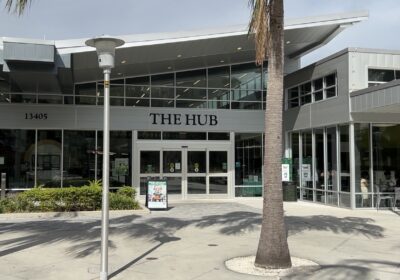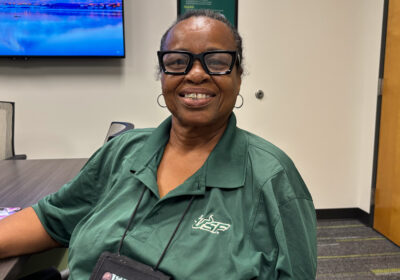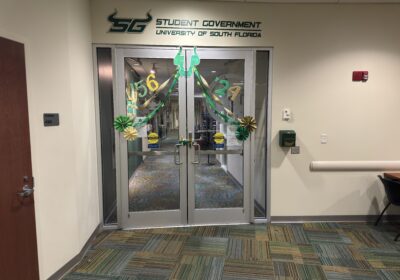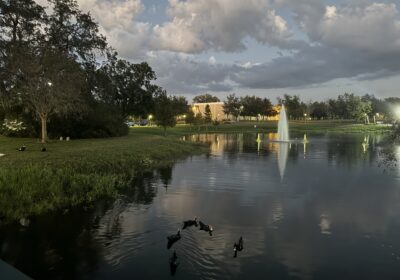Push for Islamic center gains attention

Many Muslim students claim to have inadequate space to provide religious activities. ORACLE PHOTO/CHAVELI GUZMAN
The first amendment provides American citizens the right to assemble and religious freedom, however, gathering for prayer on campus can be more challenging for students of Muslim faith than their Jewish and Christian peers.
The recurring initiative of building an Islamic Center on campus is said to be taken more seriously by senators for the upcoming term. Discussions for the Islamic Center has raised speculations with legitimacy and funding.
The idea of an Islamic Center on campus has been floating around for about ten years now according to Amani Taha, former senate president of the last term. She said this initiative is something that the Muslim students on campus have been trying to mobilize.
At the end of last year, Student Government (SG) senate pro-tempore Yousef Afifi said senators talked about kicking the initiative off the ground for the 59th term. In the fall, senators are going to put a group together to gather resources on the matter and use community connections, according to Afifi. Although it has not been finalized, he said the group will consist mostly of legislative members.
Muslim Student Association (MSA) officer and SG Sen. Murzia Siddiqui, has had communication with current Senate President Sarah Lucker about creating an ad hoc committee within the next couple weeks, with the sole purpose of conducting research for a potential Islamic Center. Siddiqui is working to gain community support and a referendum on the ballot for the midterm election to obtain an opinion from the student body.
Taha said funding the initiative with A&S fees would hinder Muslim students from obtaining a center for themselves.
An avenue for funding that does not require A&S fees would require MSA, Arab and other Muslim organizations to conduct fundraising for themselves. Afifi said all organizations have the right to request A&S funds from SG because of the criteria, but he also encourages students to initiate funding themselves.
A lack of support for the initiative was also present throughout most of the last term according to Afifi.
“The initiative was never pushed for last term because we (Senators) were distracted most of the time — probably 95 percent of the term,” Afifi said. “We were dealing with distractions and mitigating a blowback from certain decisions that were made and misinterpreted.”
The initiative will provide Muslim students a judgement-free zone, according to Afifi.
MSA has been very involved in the process of creating a place for prayer for Muslim students according to Taha. She said that MSA’s leadership is what got the initiative to be taken seriously.
With five prayers a day, Muslim students may be seen praying in the Serenity room in the Marshall Student Center (MSC) — which can only hold 25 people standing in rows — behind bookshelves in the library, or in empty classrooms if the MSC is too far according to Siddiqui.
“The Islamic Center is not just a room for prayer,” Siddiqui said. “It is a space to build a community and for Muslims to have a safe place on campus.”
Muslim students meet in the MSC for Jumu’ah — a congregational prayer that is held after noon every Friday for large prayer.
Jumu’ah is located in the biggest room or the amphitheater to hold the 200 students that participate.
MSA rents out the room, but the MSC has a policy where booking two rooms at once is not allowed and the ballroom is only available to rent once a semester. The MSC allowed MSA to have an overflow room due to the surplus amount of people. According to Taha, sometimes the prayer is lead through a video due to the capacity.
“The overflow room gets the livestream of the sermon, which was better than what was happening previously,” Siddiqui said. “Before the double rooms, we would have people spilling out into the hallways.”
Taha said the conversation of an Islamic Center on campus recurred during the SG presidential election of 2017. Both of the tickets, including current president and vice president Moneer Kheireddine and Shaquille Kent had the idea of creating an Islamic Center on their platform.
“It was a really big deal because it is a very controversial topic and a lot of students are actually afraid to touch it, because of the unfortunate climate around Islam nowadays,” Taha said.
As a senator, Taha was presented with a list of initiatives that the former relations committee chair, Saeed Sinan, had drawn up about what students wanted to see within the campus. Taha said she chose the Muslim initiative because as a Muslim student herself, she wanted to help the Islamic community.
During her term as Senate President, Taha chose to remain neutral during all initiatives, including this particular initiative, because she wasn’t sure if it would be presented to the Senate in the form of a resolution.
Afifi said strides are being made to develop a friendlier relationship with USF administration based on mutual respect and understanding. He said this year the conversation about the Islamic Center will not be skewed like last term.
“To be fair last year, in regards to the relationship between USF administration and student government, it wasn’t always positive,” Afifi said.
According to Afifi, if there are Jewish and Christian centers, it is only fair that Muslim students who contribute to the university deserve the same opportunity.
“Their (Muslim students) Christian and Jewish counterparts have worship centers on campus that they can freely and openly practice in a closed setting,” Afifi said. “We need to take a shot in trying to provide Muslim students with the same equity.”






